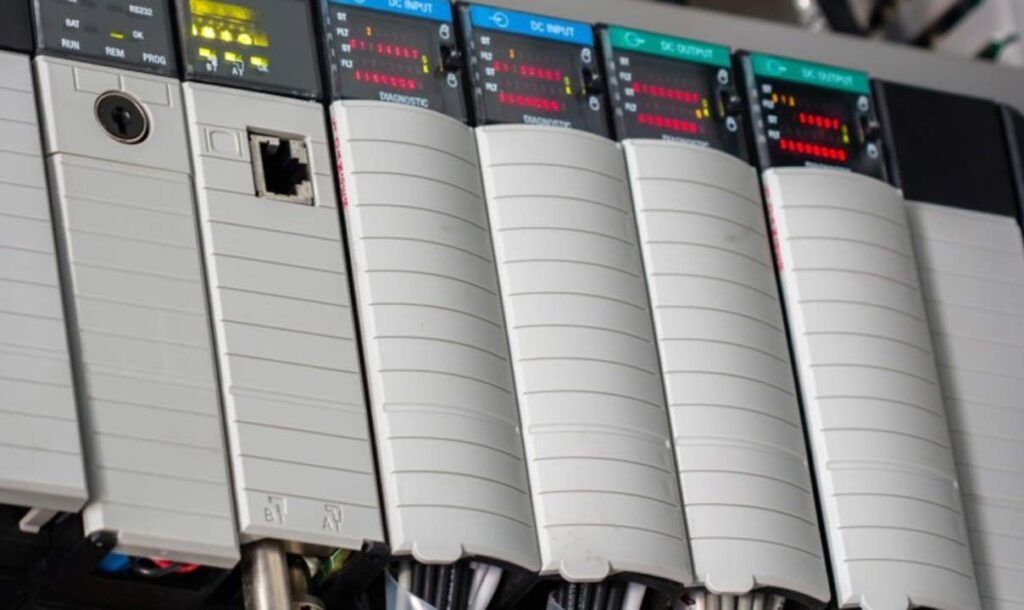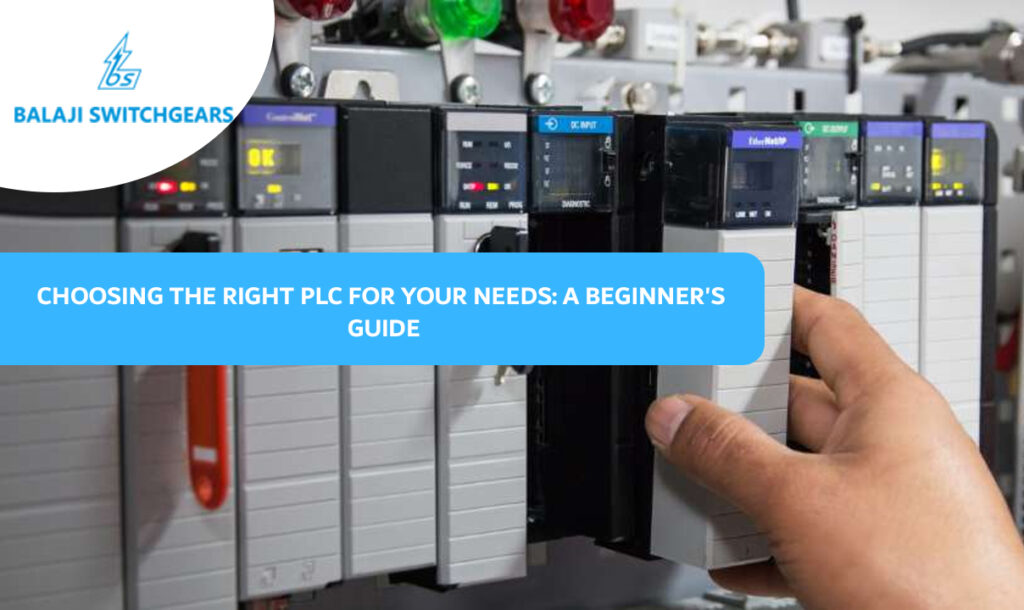In the realm of PLC industrial automation, selecting the right Programmable Logic Controller (PLC) is crucial for ensuring the efficiency and reliability of your automation systems. PLCs are the backbone of modern industrial control systems, enabling automation of complex processes and machinery. If you’re new to PLCs, understanding the basics and choosing the right one for your needs can seem overwhelming. This beginner’s guide from Balaji Switchgears will help you navigate the selection process.
What is a PLC?
A Programmable Logic Controller (PLC) is a rugged, industrial computer used to control and automate machinery and processes. It can handle a variety of inputs and outputs, process data, and execute control commands based on programmed logic. PLCs are essential in industries ranging from manufacturing to energy management.

Key Factors to Consider When Choosing a PLC
When selecting a PLC for your industrial automation needs, consider the following factors:
- Application Requirements
Determine the specific requirements of your application. Consider the complexity of the process, the number of inputs and outputs needed, and the type of control required. Different PLCs are designed for varying levels of complexity and functionality.- Simple Applications: For basic control tasks with a limited number of I/O points, a compact PLC may suffice.
- Complex Applications: For more complex processes requiring extensive I/O points, communication capabilities, and advanced control functions, a modular PLC with expansion options may be more suitable.
- Processing Power and Speed
The processing power and speed of a PLC are vital for handling the demands of your application. Evaluate the PLC’s CPU capabilities and processing speed to ensure it can manage your system’s real-time control requirements effectively.- Basic PLCs: Suitable for simpler tasks with lower processing demands.
- Advanced PLCs: Designed for applications requiring high-speed processing and complex control logic.
- Input/Output (I/O) Capabilities
Assess the number and types of I/O points required for your system. PLCs come with various I/O configurations, including digital and analog inputs and outputs. Ensure the PLC you choose has sufficient I/O capacity to meet your application’s needs.- Digital I/O: Used for binary on/off signals, such as switches and relays.
- Analog I/O: Used for continuous signals, such as temperature and pressure sensors.
- Communication and Networking
Consider the communication protocols and networking capabilities required for your system. Modern PLCs often support various communication protocols, such as Ethernet, Modbus, and Profibus, enabling integration with other devices and systems.- Basic Communication: For simple, standalone applications, basic communication capabilities may be sufficient.
- Advanced Networking: For complex systems requiring integration with other devices or remote monitoring, ensure the PLC supports advanced networking options.
- Expandability and Flexibility
Evaluate whether you need the ability to expand your system in the future. Modular PLCs offer expansion options, allowing you to add additional I/O modules, communication interfaces, or processing units as your needs evolve.- Fixed PLCs: Ideal for applications with stable, unchanging requirements.
- Modular PLCs: Suitable for applications where future expansion or flexibility is anticipated.
- Programming and Software
The ease of programming and the software available for the PLC are crucial factors. Ensure the PLC comes with user-friendly programming tools and software that match your expertise and programming needs.- Basic Programming Tools: Suitable for simple tasks with straightforward programming requirements.
- Advanced Software: For complex applications, ensure the PLC supports advanced programming features and software.
- Reliability and Support
Choose a PLC from a reputable manufacturer known for reliability and strong customer support. Reliable PLCs minimize downtime and maintenance issues, while excellent support ensures you have access to assistance when needed.- Reliable Manufacturers: Look for PLCs from established manufacturers with a track record of reliability.
- Support Services: Ensure the manufacturer offers comprehensive support services, including technical assistance and documentation.
Balaji Switchgears: Your Partner in PLC Selection
At Balaji Switchgears, we specialize in providing top-quality PLCs and industrial automation solutions. Our team of experts can assist you in selecting the right PLC based on your specific needs and application requirements.
- Expert Guidance: Our experienced professionals offer personalized advice to help you choose the most suitable PLC for your automation needs.
- Comprehensive Range: We provide a wide range of PLCs with varying capabilities to match different applications.
- Ongoing Support: We offer continuous support and maintenance services to ensure your PLC operates efficiently throughout its lifecycle.
Conclusion
Choosing the right PLC for your industrial automation needs is a critical decision that impacts the efficiency and reliability of your control systems. By considering factors such as application requirements, processing power, I/O capabilities, communication options, and expandability, you can make an informed choice. Balaji Switchgears is here to guide you through the selection process and provide the support you need for a successful automation project. Contact us today to learn more about our PLC solutions and how we can assist in optimizing your industrial processes.


Your blog is a true gem in the world of online content. I’m continually impressed by the depth of your research and the clarity of your writing. Thank you for sharing your wisdom with us.